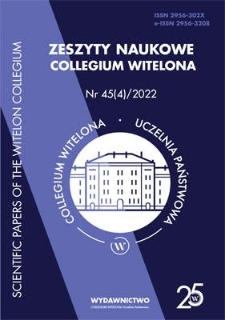Dolnośląska Biblioteka Cyfrowa udostępnia 109 949 obiektów cyfrowych
Obiekt
Tytuł: Activities of civil society institutions in the context of the concept of political participation: New challenges and additional features
Tytuł odmienny:
Autor:
Współtwórca:
Kowal-Orczykowska, Anna. Redakcja
Opis:
Zeszyty Naukowe Collegium Witelona, nr 45(4)/2022, s. 73-84
Abstrakt:
Wydawca:
Wydawnictwo Collegium Witelona Uczelnia Państwowa
Miejsce wydania:
Data wydania:
Typ zasobu:
Identyfikator zasobu:
doi:10.5604/01.3001.0016.3388 ; oai:dbc.wroc.pl:121709
Język:
Powiązania:
Zeszyty Naukowe Collegium Witelona ; Zeszyty Naukowe Collegium Witelona, nr 45(4)/2022 ; Zeszyty Naukowe Państwowej Wyższej Szkoły Zawodowej im. Witelona w Legnicy
Prawa:
Wszystkie prawa zastrzeżone (Copyright)
Prawa dostępu:
Dla wszystkich w zakresie dozwolonego użytku
Lokalizacja oryginału:
Tytuł publikacji grupowej:
Kolekcje, do których przypisany jest obiekt:
- Dolnośląska Biblioteka Cyfrowa > Uczestnicy Konsorcjum > 18. Collegium Witelona Uczelnia Państwowa
- Dolnośląska Biblioteka Cyfrowa > Zasoby > 2. Czasopisma > Czasopisma współczesne
- Dolnośląska Biblioteka Cyfrowa > Dziedziny nauki > 5. Nauki społeczne
- Dolnośląska Biblioteka Cyfrowa > Dziedziny nauki > 3. Nauki medyczne i nauki o zdrowiu
Data ostatniej modyfikacji:
14 lis 2024
Data dodania obiektu:
22 maj 2023
Liczba wyświetleń treści obiektu:
134
Wszystkie dostępne wersje tego obiektu:
https://dlibra.kdm.wcss.pl/publication/160005
Wyświetl opis w formacie RDF:
Wyświetl opis w formacie OAI-PMH:
Obiekty Podobne
Borowski, Kamil
Brol, Marcin Czetwertyński, Sławomir
Gruszewska, Ewa
Piątek, Dawid Pilc, Michał Szarzec, Katarzyna
Lewkowicz, Jacek Metelska-Szaniawska, Katarzyna
























